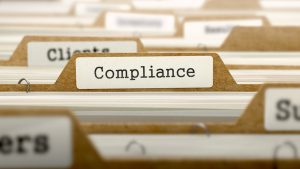No business is immune to the possibility of leaks and corporate scandals. Of course, most are not extremely high-profile and cause an enormous corporation to collapse (e.g. remember Enron?), but even minor breaches and leaks can damage a business and its reputation. Business owners take on a lot of responsibilities, which includes protecting their business and their people.
A 2019 Harvard Business Review release noted that PwC conducted a study that found that “economic crime and fraud” was even more rampant than one would expect. PwC reported that “49 percent of 7,228 organizations reported that they had experienced economic crime and fraud in the prior year” and that over 50 percent of these offenses were committed by “internal actors.” Scandals usually occur over time, starting out slowly and gradually becoming bigger and more destructive.


First and foremost, it is important for leadership to collaborate on the creation of solid compliance procedures and policies that aim to protect their businesses. This includes realizing that corporate scandals might appear to benefit the bottom line in the short-term, but can take a toll on employees throughout the organization and eventually end up being a disaster. Although many people in the workplace label training as “boring” and “mundane,” training related to security and the minimization of shady conduct in the workplace are critical. Christopher Skroupa of Forbes noted that “This should start with confidentiality agreements and the basics of reminders about conversations in public places, emails, and documents.”
Furthermore, making employees aware of the legal and financial consequences of a corporate scandal must be done. When the accounting giant Arthur Andersen collapsed after being accused of shredding thousands of documents regarding the Enron scandal, around 85,000 people found themselves unemployed. All of their clients also received the burden of finding a new auditing firm, and many legal battles were carried out. Of course, this was an extremely complex case, but if a scandal can cause a multi-billion dollar corporation to crash, the outcome of a scandal could be devastating for a small business as well.
Executives and management oftentimes defer responsibility regarding insider crime and how the company responds to it, usually stating things like “it’s going to happen” and “all businesses have some unethical people,” but they should actually be paying more attention. They must make it a point to notice ethical behavior, and they can find ways to reward employees for their honesty. Many businesses have incentive procedures in place that can easily be abused by employees because they may find ways to use dishonest means to win rewards. Discovering different methods of encouraging and rewarding ethical behavior can help, and it is important to take professional behavior into consideration when undertaking performance reviews.


A company’s culture also plays a huge role in scandals. Maintaining a “toxic” workplace can lead to unhappiness, dishonesty, and ultimately a potentially consequential scandal. Two recent examples of this include Uber’s 2017 scandal, when a former engineer from Uber wrote a letter alleging blatant sexism and aggression in Uber’s workplace, and Wells Fargo’s 2016 scandal in which burnt out employees opened millions of fake accounts due to unrealistic sales targets set by leadership. Of course, leadership and employees don’t have to be best friends, but having a comfortable company culture that makes people more inclined to do honest work creates a better environment all around. Employees who trust leadership are likely more inclined to share concerns when they notice something that seems questionable. Being available to employees may give them more courage to speak up so that ethical behavior gets shut down before it can cause damage to an organization.
Setting reasonable goals for employees, promoting a safe and open environment, and providing benefits that allow employees to take care of themselves is vital to the success of any business. Playing favorites, bribing people, not being careful when conducting exit interviews with disgruntled employees, and recruiting new management just based on their impressive work history (and not their integrity) can create huge problems for a company. Listening to employees and following up on concerns must be a priority, but unfortunately, many leaders greatly dislike receiving negative feedback and actually having to act on it so they turn a blind eye and act like nothing shady is happening.
Overall, the goal of leadership across all fields should be to ensure that employees enjoy working for them due to the company’s values and positive culture, not just the amount of revenue they bring in.
The Atlanta Small Business Network, from startup to success, we are your go-to resource for small business news, information, resources.


While you’re here, don’t forget to subscribe to our email newsletter for all the latest business news know-how from Atlanta Small Business Network.
This has been a JBF Business Media production.






